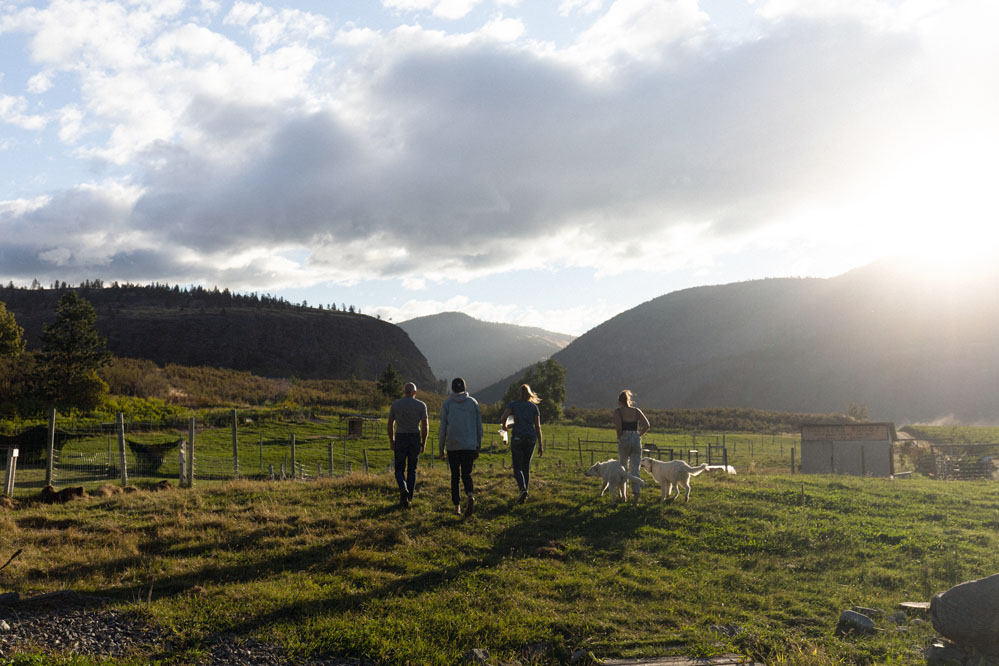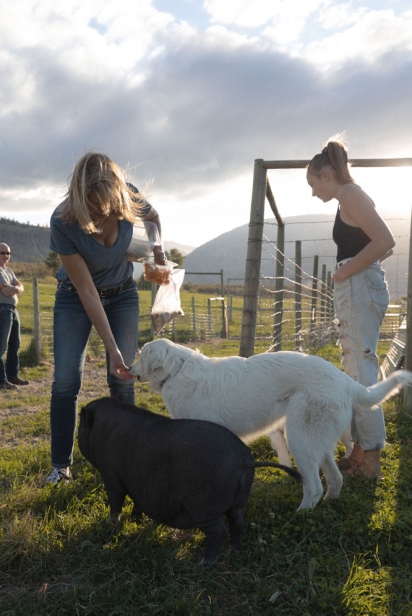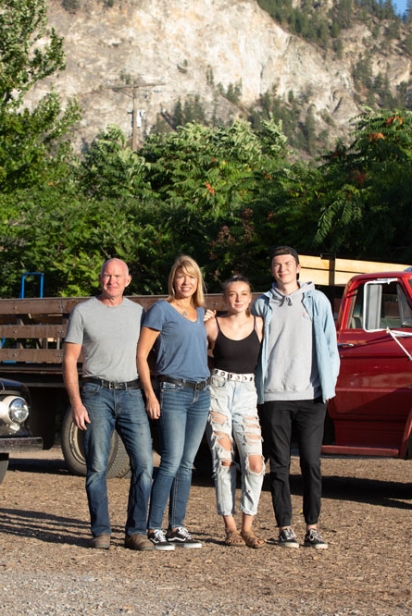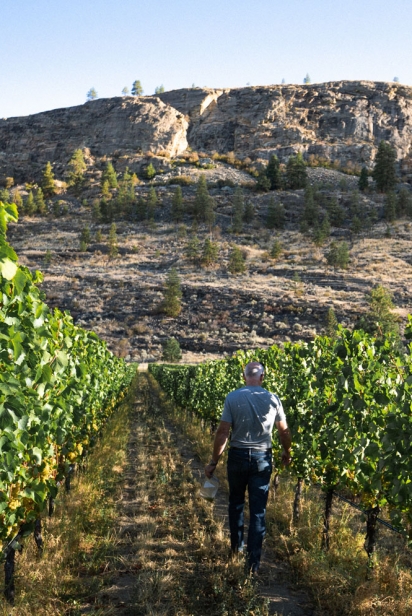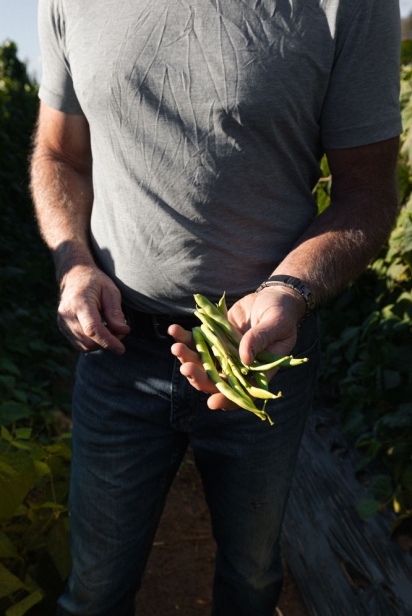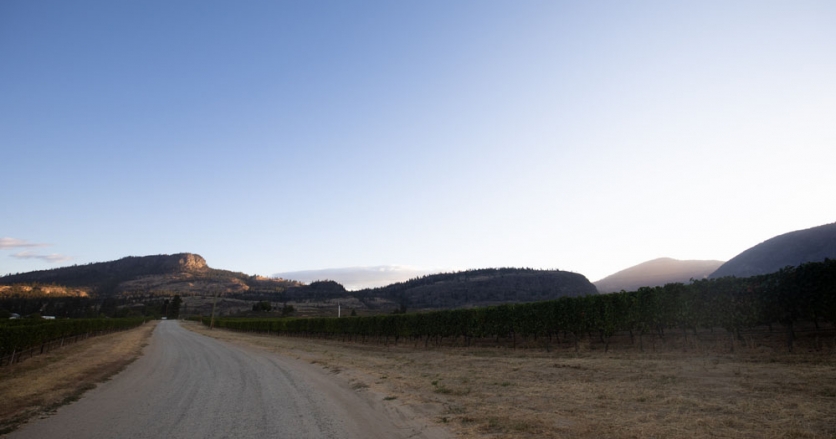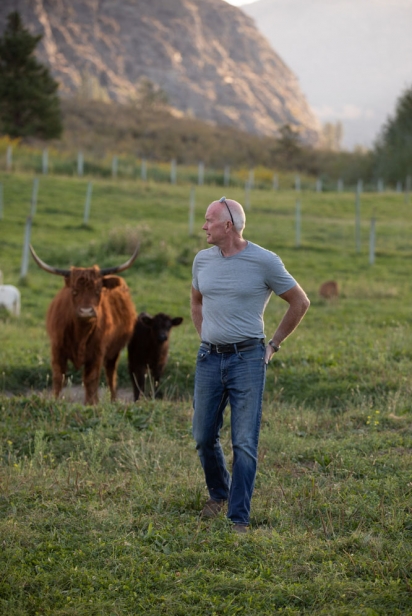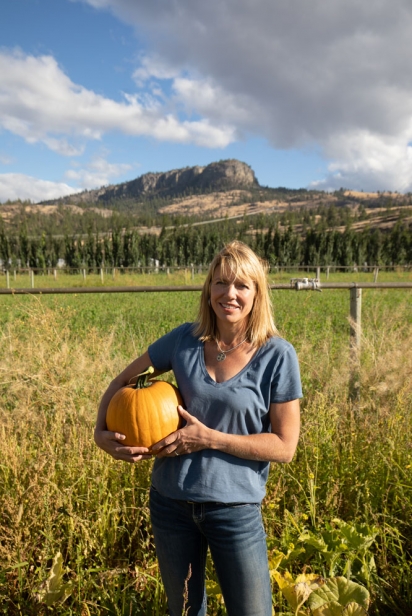A Family Affair
Four generations of the Covert family have farmed this land in the southern Okanagan Valley and each has put its stamp on some aspect of the family business. You can taste it in the intense fruit in your glass and feel it in the dust kicked up by the cherry-red 1952 Mercury that ferries visitors on tours of the organic vineyard.
“This truck was restored by my mom, Diana, and has the original transmission,” says current co-proprietor and winemaker Gene Covert, steering the vintage vehicle along bumpy back roads, and regaling guests with family stories and insights into the world of regenerative farming.
“Our farm mechanic was the enabler and Mom funded the project,” he says of the meticulously restored one-ton truck, rescued from a nearby field, and now a recognizable symbol of the family-friendly farm and winery.
The other recognizable symbol, and one that’s pictured on the Covert Farms wine label, is McIntyre Bluff. The iconic rocky ridge backstops this 650- acre property, its vines undulating in tidy rows across the gravelly outwash at its base. This terroir, with its dry desert climate, is perfect for growing grapes without chemical fungicides and herbicides — the kind of clean fruit that goes into Covert Farms’ premium low-intervention wines.
Gene and his wife, Shelly, are members of the latest generation to put its stamp on the Covert family farm, but this welcoming destination winery is just one of the reasons this has been a gathering place for locals and visitors for decades.
One tomato, two tomato
It was the late 1950s when Gene’s American grandfather, George Covert, drove up into this rugged landscape, the northern tip of the vast Sonoran Desert, and bought land to grow fruit and vegetables. Shelly marvels at the grit of his wife, Winnifred, who left the family home and successful tomato business in California, to start over in this sparsely populated corner of Western Canada.
“She gave up her life in California to come to the Okanagan when there was nothing here,” Shelly says, “and she worked and lived here until she passed at age 99.”
George Covert planted 100 acres of field tomatoes and 100 acres of onions in 1960, soon adding hybrid and native labrusca grapes to ship to B.C.’s early commercial wineries.
It was a successful operation by any measure. By 1988, when the Coverts joined other Okanagan grape growers in the government-sponsored hybrid grape pull out — through which, as a result of the Canada-U.S. Free Trade Agreement, farmers were paid to pull up their native grapes and plant something else — they had 180 acres of vineyards, one of the largest in the valley. They pivoted to growing apples instead, but eventually returned to wine, planting the trade agreements sanctioned vinifera varietals instead.
Gene says his grandfather was a practical farmer, who made decisions based on economics, but he must have had a pioneering, romantic spirit, too. The winery’s rustic tasting room was once home to Tom and Jerry, a pair of George’s beloved draft horses.
“It was the early 1980s when my grandfather bought the horses,” Gene says, remembering the team hauling wagons filled with vegetables from the fields.“
It was sort of convenient, to have them walking ahead as we picked,” he chuckles, “but not when they decided to gallop home to the barn, with cucumbers and onions flying.”
It all adds to the local flavour and history during a tour of this working organic farm and winery. There’s time to stop to taste grapes on the vine and warm strawberries in the field and to admire the herd of shaggy Highland and Speckle Park cattle, also integral in biodynamic agriculture.
The wine shop has the air of a country store, with seasonal organic produce from the farm, local preserves and other tasty food to take away. Next on the to-do list, says Gene, is direct farm sales of his own pasture-finished beef, pork and lamb, perhaps even the farm’s own charcuterie. “
My grandfather had to quickly diversify to make the farm work,” he says, “and that’s my mantra, too. Have that diversity, so if something fails, there’s something to pick up. It’s another level of resiliency.”
And the Coverts are certainly resilient, each generation adds new ideas to keep the family farm relevant, fun and fruitful for the next. They’ve held huge summer tomato festivals, hosted the Freak’n Farmer adventure race, a muddy, outdoor obstacle race organized by the Covert family with Hoodoo Adventures for the past eight years and the event that inspired their television debut on The Amazing Race Canada. Today, Covert Farms is a hub for agri-tourism and a place for country weddings, team-building events or just to gather for some snacks after a hike up into the surrounding bluffs.
“We’ve tried a lot of things, some maybe too early or we ran out of steam,” Gene admits with a smile, ”but I’m happy that a few of them are working.”
Generational genesis
Gene’s parents, Mike and Diana Covert, ran the farm with Mike’s parents, until George Covert’s death in 1996. Gene had gone off to UBC to study physical geography, but moved back to Oliver with his new wife and worked alongside his father growing fruits and vegetables. When Mike died of a sudden illness at the age of 60, Gene and Shelly took the reins, transitioning to organic farming, then planting vinifera vines and diving into the winemaking business.
They’ve raised three children on the farm, with Shelly, a teacher and holistic nutritionist, in charge of their home schooling. If that wasn’t enough, Shelly turned her creative eye to the old draft horse barn — first restoring it as a farm stand and restaurant, serving freshly baked pies and muffins, and then opening the wine shop and tasting room.
She also took on the job of designing tours, including farm-totable school tours for elementary students and private wine- and food-tasting experiences, and organized many annual events that have made the farm a popular community hub.
“I decided I had to make a place for myself on the farm,” she says. “We keep ourselves busy.”
With a huge open-air barn for country weddings, pre-booked wine tours (during COVID restrictions) and new pop-up dinners with local chefs, there’s always something going on at Covert Farm.
“This is an amazing piece of property and it’s meant to be shared,” she says. “We have a great love of watching people enjoy themselves here.”
A hands-on education
Today, it’s all hands on deck for the busy Covert family. The company’s tagline is “cultivating enjoyment” and there’s lots of that going around during a wine tasting on the shady patio, complete with local cheeses and charcuterie, to cap off the farm tour. While adult guests swirl estate-grown wines in their glasses — a rich Roussanne touched with aromatic Viognier, an intense Grand Reserve Cabernet Sauvignon and mouthwatering Rosé — 13-year-old Rhya Covert takes the guests’ children to the barn to meet her chickens, llamas and Dahlia, the potbellied pig, then collects them like a mother hen, for an organic juice-tasting and colouring session.
“They learn a lot about how the animals help out on the farm,” says Rhya, who’s planning for a career in veterinary medicine.
Growing up on a small farm is always an education, but for the Covert children, chores and responsibilities are more diverse than most. Rhya started helping with school tours at the age of eight and launched her Mini Farm Tour for Kids this summer. Her older brothers, Faolan and Kaelan, work as farm mechanics, with Faolan now studying mechanical engineering at the University of Victoria. On the day edible Vancouver visited, the boys were in the winery, helping their mother bottle wine.
“Everyone gets roped into doing something here,” says Shelly, who also advocates cooking fresh healthy food. “
All the kids have duties for the house and cooking days,” she adds. “The kids all have to do a night of cooking — it takes a lot of pressure off Gene and me.”
Beyond her farm tours, Rhya raises hens and sells eggs, saving money for her first car.
Gene says it’s reminiscent of a “little potato” business he had with his enterprising cousins back in the day, a bit of entrepreneurial training thanks to his grandfather George.
“When we were 12 or 13, my sister and I, and my cousins had this nugget potato business,” he recalls. “It was before the whole small vegetable thing hit in restaurants, but the potatoes were dug fresh every morning, and they’d just throw all of the little ones away. My grandfather said we should see if we could pick them up and sell them, and soon we were sitting on a wooden box at the vegetable stand, selling them for five cents a pound.”
Though the adults eventually took over their booming nugget potato business — “we had way too much cash in our pockets” — he says it gave him a taste for innovation and “early experience with a hostile corporate takeover”.
Organic food, organic wine
Farming is a business, but it’s also a lifestyle, and for Gene and Shelly Covert, holistic and family-focused ideals are at the heart of every decision.
Though his father dabbled in organic pest-management for the apple orchards, Gene says his death in 2004 suddenly left the young couple in charge, and the transition to certified organic production, growing organic food for their family, was a logical step.
Planting organic vinifera vineyards and making organic wine was not far behind.
Today, Covert Farm has more than 142 acres of certified organic fruit, berries, vegetables and grapes, making it the largest organic farm in the Okanagan Valley. In 2010, the Coverts were recognized for their work with the B.C./Yukon Outstanding Young Farmer Award.
They’ve also distinguished themselves in the organic wine world, winning seven medals — four gold and three silver — at the 2019 International Organic Wine Awards in Germany, competing against wines from 28 countries and being the only Canadian winery to participate.
Covert Farms Estate Winery remains small, producing just 4,000 cases of premium wine each year, using natural, low-intervention winemaking techniques.
The couple has leased the organic vegetable- and fruit- growing side of the business to a former employee (who operates under the name Seacrest Organics) and 300 acres of vineyard land to Peller Estates.
That allows Gene to focus on organic, biodynamic and regenerative farming in his own vineyards. It’s all about feeding the soil microbiome to produce healthy, resilient plants and ultimately delicious fruit for premium wines.
Grain crops, trees and native vegetation around the vineyards encourage biodiversity. Night hawks keep destructive starlings at bay, and with cover crops grazed over winter by their cattle and sheep, there’s no need for expensive chemical weed control and fertilizers.
“The diverse cover crops, inter-planted and rotated with main crops, and the livestock accelerate the whole system,” he says, pointing to lentils that fix nitrogen, reduce weeds and the need for tillage, providing habitat for predator insects and food for their free-range chickens.
No-till farming also builds organic matter in the soil, saving precious water in this desert environment.
“We’re finding that vineyard health is getting better, with increased resilience to diseases and pests, and we can maintain quality at increased yields,” Gene says.
“We’re striving to reduce water use, striving for a point where we could dry farm, and that seems possible.”
Organic farming gets easier over time, and “the cost of production starts to drop below conventional production,” Gene adds, something his grandfather would surely endorse.
“The numbers add up and it just seems like it makes sense — healthy people and healthy societies need healthy food that comes from healthy land,” he says. “I’m looking forward into the future. We have three children, and my sister has a couple of kids, and I think about creating a healthy environment for future generations on the farm, but also adding value to the property.”
Passing it on
Gene’s latest research is into succession planning. He says it’s rare to see family businesses survive over multiple generations — just 12 per cent make it to the third — though wineries around the world have some of the best longevity.
Gene says his family put no pressure on him to join the business after university. He’s left the door open for his own children to pursue their own paths, too.
“My generation wasn’t saddled with that — there were no conditions put on what happens after university,” he says. “But I’d like to see, at some point — if the children are interested, that the land can be stewarded into the future.”
For now, he’s concentrating on making good wine. Gene’s flagship red is Amicitia, the Latin word for “friends.” The blend is an inclusive combination of his organic Merlot, Cabernet Sauvignon, Syrah, Cabernet Franc, Malbec and Petit Verdot fruit.
Reviewers have called it “big,” “brooding” and “rustic,” but also “friendly and welcoming,” like this amicable family.
And like the big red truck, still running with its original transmission after 75 years that is what keeps this unique business rolling along.
Covert Farms Family Estate
300 Covert Place, Oliver, B.C.
covertfarms.ca | 250.498.9463 | @covertfarmsfamilyestate


